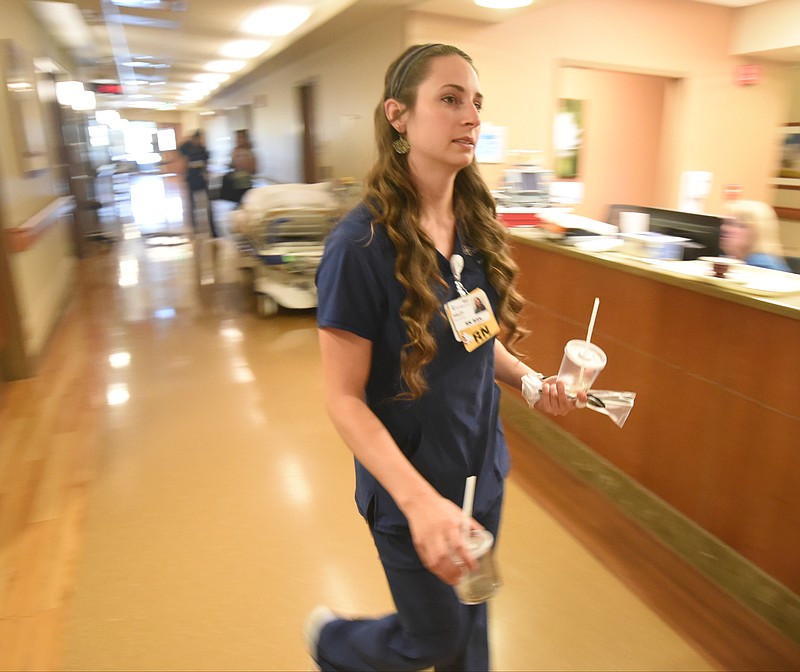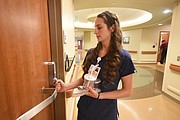If you were just reading the posts on an online discussion board for nurses, you might think the profession was in danger of collapse:
"Lack of support from management, unsafe assignments, politics, being expected to suck it up in any circumstance, disrespectful doctors, lack of teamwork, being treated like a concierge/waitress, evaluations based on customer satisfaction instead of care given to patients I'm getting out," read one recent posting on Allnurses.com.
And there are serious problems with nurses' job satisfaction. In a detailed 2014 survey by Nashville-based HealthStream, nurses were less satisfied with their jobs than other hospital employees in 33 of 36 categories. Nearly one in five of the nurses who work for Hospital Corporation of America, also headquartered in Nashville, left their jobs last year, the company reported.
But other surveys report that, in general, nurses are overwhelmingly happy in their careers. A 2013 survey of registered nurses concluded that more than 90 percent were pleased with their jobs.
So which view is correct? Well, both, according to interviews with top local nurses.
As the number of seniors in the U.S. continues to grow, and the Affordable Care Act gives more people insurance to pay for medical care, demand has grown for caregivers. The starting salary for a nurse locally with a four-year education is $43,000 before any overtime or pay for working a night or weekend shift, much more than many of their fellow college grads are earning.
Nurses also now have the opportunity for advanced degrees in new areas. Nurse practitioners, for example, are even allowed to run their own independent medical offices - although not in Tennessee - and can earn more than $100,000.
"There is not another profession in the world that has as wide a range of jobs," said Rhonda Poulson, chief nursing officer at CHI Memorial, where nurses are two-thirds of the workforce. "Nurses can do anything, just about, including working from home in fuzzy slippers."
But the core of traditional nursing is at a patient's bedside, and that is where nurses seem most unhappy.
Bedside nurses often face heavy physical and emotional demands, patients who, if anything, have become even more demanding, a lack of authority to make decisions on their own, and a greater need to spend time at a computer to justify payments from insurers.
"If this is not your calling, you are not going to find it is a fun job," Poulson said. "You have to want to get out of bed every day and put your feet on the floor and take on the challenges."
While doctors may drop by a hospital room for a few minutes every day, it is the nurse who is there on the floor full time, dealing directly with patients and their families.
"We're presenting life plans that are not necessarily fun," Poulson said, "saying they need to exercise, change their diet - no sugar drinks, stopping tobacco use."
Many patients are paying higher deductibles and co-payments for their care, so they are more demanding. And hospitals are putting more emphasis on keeping them happy.
"There is this rise in consumerism. We've trained consumers to voice an opinion on everything," Poulson said.
The federal government posts patient feedback about their care online, for everyone to see, and the nursing staff is on the front line to keep those patients happy.
"You have to provide not only great bedside care, but you have to be aware of the quality metrics of what the public is expecting of you," said Jan Keys, chief nursing executive at Erlanger. "The hospital puts that pressure on the nursing staff, it's our face to the public."
But some nurses say patient demands can be unreasonable.
"I don't blame patients when they have legitimate needs and wants," one nurse wrote on AllNurses.com. "I blame them when I'm expected to serve an entire family with cans of soda, pillows, blankets, sandwich boxes because they have somehow mistaken a hospital stay for a mini vacation."
Bedside nurses now also complain about the need to spend a significant amount of every day sitting at a computer, entering data to summarize their care and to justify payments by insurance companies.
"Any time you are not dealing with a patient one-on-one at the bedside is time away from the patient," said Dr. Chris Smith, director of the University of Tennessee at Chattanooga's School of Nursing.
And then there is overtime.
Admissions continue to grow at both CHI Memorial and Erlanger hospitals, increasing the demand for nurses. Hospital officials admit that can lead to problems.
"The demand has gotten way out in front of supply," Keys said. "Erlanger has opened 60 additional beds here at the Baroness campus. You have to have nurses to keep up with the beds you are opening."
If new hires are not available, current staff is asked to put in more hours. Bedside nurses often work three 12-hour days, giving them more time off if that is what they choose. But many of them instead agree to an extra shift, or two, and that can lead to burnout.
"They see so many critical patients who are very sick, and it doesn't take long to get to the burnout phase if they are working a lot of overtime," Keys said.
Some nurses seem to be attracted to the stress.
Wanda Perry, now the assistant chief nursing officer at Tennova Healthcare in Cleveland, worked in orthopedics at Erlanger early in her career.
"I realized one night when we had a seriously ill patient that I needed to get more experience, so I asked to transfer to [the intensive care unit] and ended up loving it," Perry said. "It's exciting. There is always something happening, and you can really make a difference in a patient. I thrived on that."
Others realize early on that is not something they want to experience.
"As somebody who has never been in the intense side of nursing, in trauma or the ICU or the [emergency room], that would be very stressful," Smith said, "because I'm not wired that way."
What is key for all new nurses is to find their niche, Smith said.
"The nice thing about the profession is that if your whole life you were queued up to be an ICU nurse or a trauma nurse, and then you find you can't handle the stress - it sounds cliched, but if what you set out to do in nursing doesn't really appeal to you, there are so many other places to go."
Both CHI Memorial and Erlanger have realized they need to help beginning nurses find the right fit or else they risk losing them to nursing entirely.
CHI Memorial has a residency program where new nurses spend time in several different departments.
"We looked at our data and realized that our turnover was largest with our newest hires who had the shortest orientation time," Poulson said. "Apparently, we were putting nurses to shifts quicker than they felt like they were ready."
Now new nurses spend their first five or six weeks rotating among many different departments. At the end of their residency, the nurses list their top choices for a place to work, and the staffs in those departments decide which new nurses seem to be the best fit.
"We're at a 90 percent retention rate in the first year of the program," said Poulson, compared to a national average of 82 percent for first-year nurses.
Erlanger has a similar program, where recently hired nurses list their top three choices for places they would like to work, and then are given the opportunity to see what that is like.
"We really try to get them in the right fit," Keys said.
Longer-term, nurses' career opportunities are expanding and in good ways, both outside the hospital and in taking over some of the roles traditionally filled by doctors.
In one new role, that of nurse navigator, nurses keep in touch with patients after they leave the hospital to be certain that they fill their prescriptions, take their drugs properly, set up appointments with their family doctors, and keep those appointments. They also help coordinate care with rehabilitation centers or physical therapists or home care nurses.
That has become increasingly important as both insurance companies and the federal government tell hospitals they will be paid based on whether a patient is correctly treated and does not come back to the hospital, instead of just on the basis of what services they were given.
"We are sometimes too focused in nursing about educating nurses to work in acute care [in a hospital], where the length of stay is diminishing," said UTC's Dr. Smith. "Now we're discharging fairly acutely ill individuals to go home. There has to be somebody in the community who keeps those patients from returning."
The other big change is the growing role of nurse practitioner. Nurse practitioners have additional training, at least one year and often more, and they now may specialize in family care, mental health, acute care, pediatrics, and adult gerontology, among others. In 23 states, they are allowed to run their own independent medical practices, without the supervision of a doctor.
Smith clearly sees that as a path she believes the nursing profession should follow.
"We hope we will be there at some point," she said.
That may take a while. Tennessee requires a nurse practitioner's work to be reviewed by a doctor, and in the recent legislative session there was an effort to increase the restrictions on nurse practitioners. In the end, a task force was set up to recommend what limits should be set on their practice of medicine.
The task force's proposals could have a big impact on health care in the state, Smith argues. As the number of family or primary care doctors declines, "nurse practitioners are stepping in, in rural areas and in inner-city clinics," she said.
In the end, what seems to attract every nurse to the profession is not the money, but rather the opportunity to do good.
Haley McKinney graduated last year from Middle Tennessee State University with a nursing degree and started work doing post-surgical care at CHI Memorial in December.
Why did she become a nurse?
"I knew I cared about people and making a difference in people's lives," McKinney said. "Nursing is truly a collage of multiple jobs, and oh, by the way, you may have to do CPR and save someone's life in the middle of all that."
Contact staff writer Steve Johnson at 423-757-6673, sjohnson@timesfree press.com, on Twitter @stevejohnsonTFP, and on Facebook, www.facebook.com/noogahealth.

